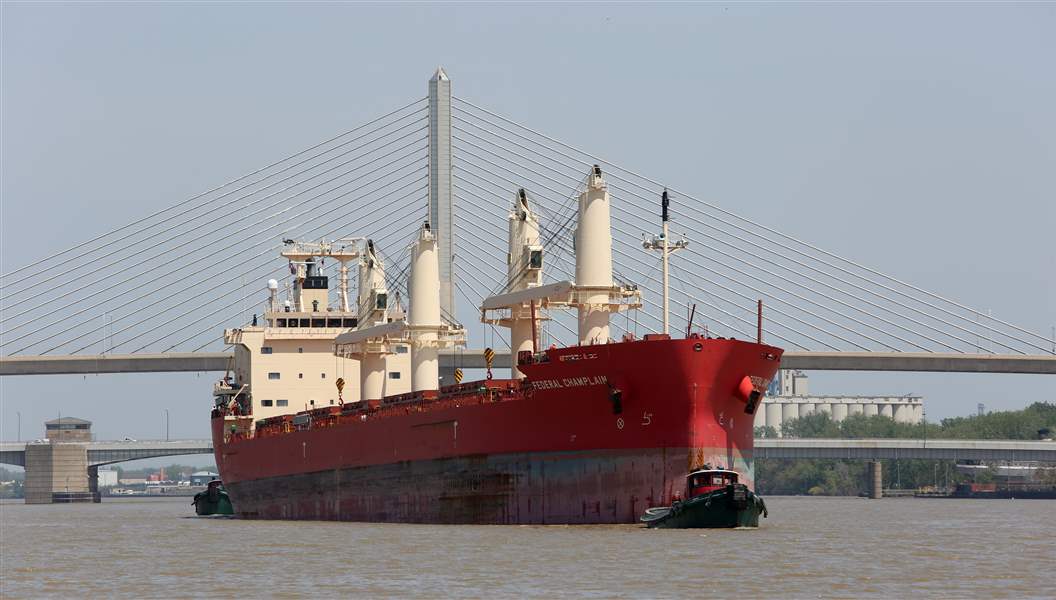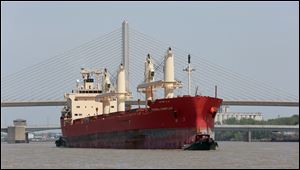
2 of 3 delayed ships leave Toledo cargo dock
5/16/2018
The Canadian boat Federal Champlain makes its way up the Maumee River Wednesday in Toledo. The ship was one of three ships that was effectively stuck in Toledo because of a labor dispute between a local longshoremen's union and a Port of Toledo stevedore.
The Blade/Dave Zapotosky
Buy This Image
Two of three ships delayed at the Port of Toledo by a labor dispute left the dock Wednesday after the U.S. Coast Guard approved a plan to use tugboats to pull the ships into open water, rather than relying on harbor pilots whose refusal to cross a Longshoremen picket line had led to the bottleneck.
Montreal-based Fednav, which owns the freighters Federal Champlain and Federal Kumano, initially sought a waiver from the Coast Guard that would have allowed the company to maneuver its ships away from the docks without the assistance of a pilot. That request was denied.

The Canadian boat Federal Champlain makes its way up the Maumee River Wednesday in Toledo. The ship was one of three ships that was effectively stuck in Toledo because of a labor dispute between a local longshoremen's union and a Port of Toledo stevedore.
But Coast Guard spokesman Lorne Thomas said a second request to use tugboats to pull the ships about 500 feet away from the dock and then deliver pilots to the vessels so they could continue their voyages to their next ports was given the OK.
“That was safe and a legal approach, so we did not object to that plan,” Mr. Thomas told The Blade.
The Champlain had been delayed for about 10 days, and the Kumano for a shorter time, when the pilots — required by regulation to guide overseas vessels through unfamiliar harbors and channels — refused to cross a picket line set up by International Longshoremen’s Association Local 1982. The union has been engaged in a long-running dispute with Midwest Terminals of Toledo International, the stevedore company operating the dock under contract with the Toledo-Lucas County Port Authority.
Keeping the ships tied up there had been seen by the union as a key bargaining chip in its battle with Midwest. Union officials have said the delay could cost the shipping companies and the terminal tens of thousands of dollars a day.
Local 1982 and Midwest have been embroiled in a long-standing and complex conflict laced with allegations of racial discrimination and unfair labor practices. Having received decertification petitions from a majority of Local 1982’s members, the company no longer officially recognizes the union, while the union has challenged those petitions as the product of Midwest’s allegedly unfair practices.
William Yockey, trustee of Local 1982, expressed frustration with the Coast Guard on Wednesday, suggesting it had broken rules that require it to stay out of labor disputes.
"We're very disappointed that the 9th Coast Guard District intervened in a labor dispute to let these ships go off the dock without a pilot,” he said.
Though the tug operators who moved the freighters also are represented by a union, Mr. Yockey said there were no provisions in their contract that allow them to refuse to cross another union’s picket. Once the Federal Champlain and Federal Kumano were out in the harbor, Mr. Yockey said the pilots were “duty bound” to take the ship.
The freighter Reggeborg, another ship affected by the pilots’ refusal to pass the picket line, remained at the port authority dock Wednesday, though Mr. Thomas said the Reggeborg’s owner was working on a plan similar to that of Fednav to get its ship free.
Alex Johnson, president of Midwest Terminals, said his company was unaware of arrangements Fednav had made for its ships to depart other than receiving notice that dock workers were needed to assist them in doing so.
Marc Gagnon, director of government affairs for Fednav said the company had advised its owner, Royal Wagenborg of The Netherlands, of the means it had used to move its ships. An inquiry to Royal Wagenborg yielded no response by Tuesday evening.
The Fednav spokesman said his company was still calculating its costs associated with the incident, which included hiring a tug to come from Cleveland to assist with the departure maneuver as well as the value of the two ships’ lost time.
But it was, he said, “an extremely expensive delay for something that is not our case,” and until the specter of similar delay is lifted, Fednav will have to think carefully before booking any cargoes to or from the Midwest-managed dock.
“I think it’s fair to say every ship owner will hesitate” to serve that part of the Toledo port, Mr. Gagnon said.
While the Kumano headed downriver toward Maumee Bay and its next call in Sarnia, Ont., the Champlain sailed up the Maumee River to the ADM grain elevator on Miami Street, where it was to take on a soybean cargo destined for Italy, Mr. Gagnon said.
Contact David Patch at dpatch@theblade.com or 419-724-6094.